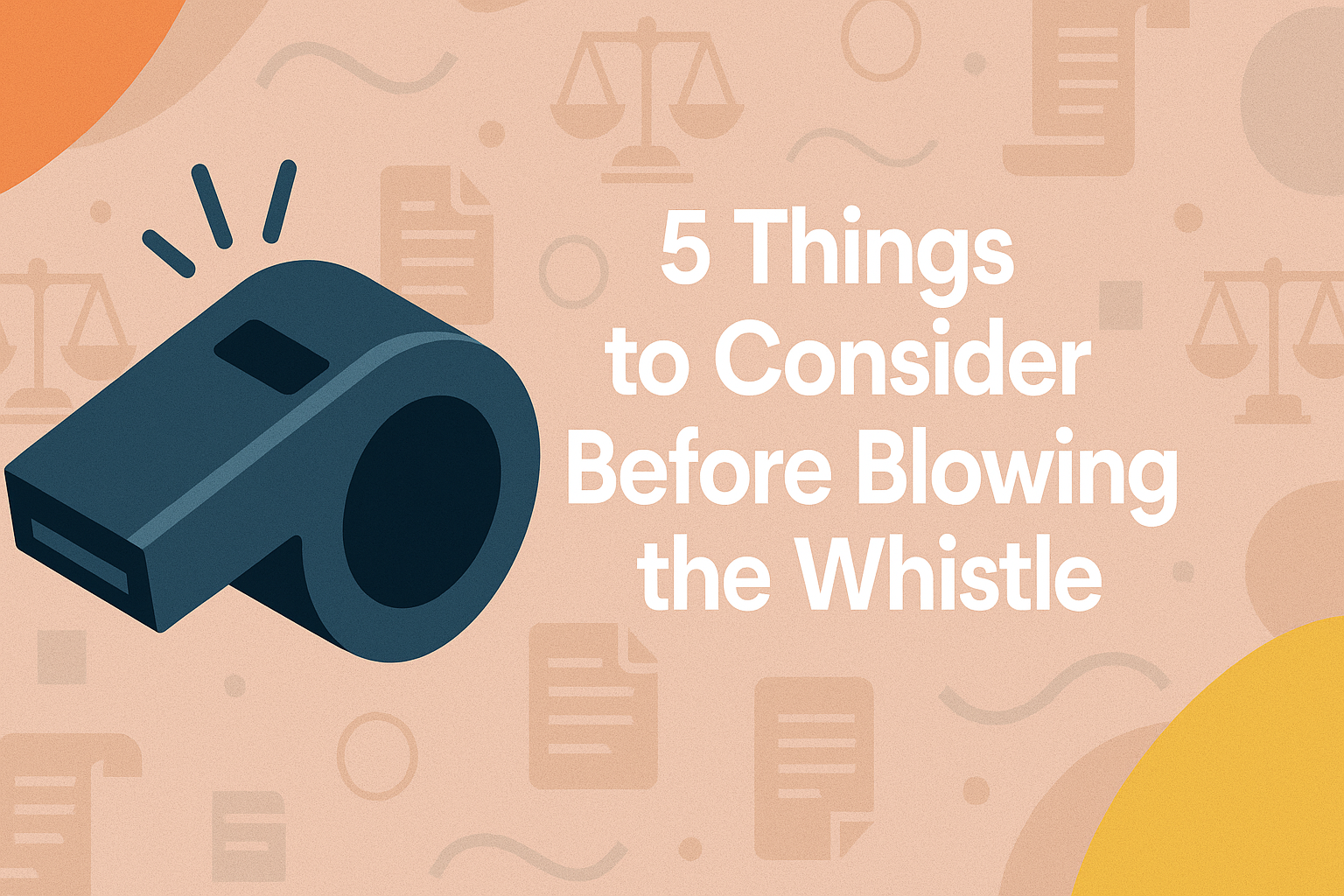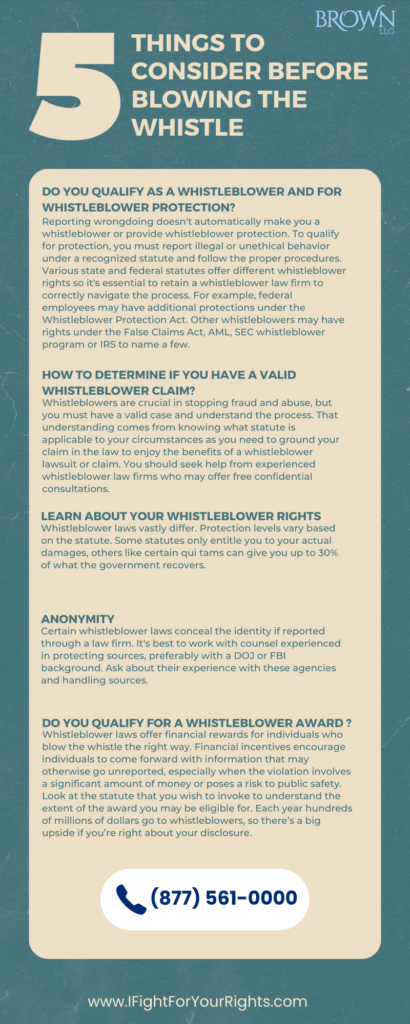5 Things to Consider Before Blowing the Whistle

Table of Contents
Do You Qualify as a Whistleblower and for Whistleblower Protection?
Just because you report something that you think is wrong, doesn’t necessarily mean that you qualify as a whistleblower or further that you qualify for whistleblower protections. A whistleblower is colloquially used as someone who exposes something, but under the law to qualify for protection from retaliation, the individual needs to ground their disclosure of illegal or unethical behavior in a recognized statute that has protections, ensure that the conduct reported is covered by that statute and do so in the right manner. For example, if you want to blow the whistle on the fact that you’ve noticed in the breakroom the boss only purchases free M & M’s and you’ve complained that you demand free peanut M & M’s and no one will listen, that ”nutty” request will not be cognizable under the law. If however, you are an in healthcare setting and are aware of systemic fraud against Medicare you may qualify for protections under the False Claims Act which acts as a shield from retaliation and a sword allowing the whistleblower to receive up to 30% of what the government recovers in the fraud.
In the private sector plenty of other statutes have whistleblower protections that include the shield and sword, like SEC whistleblower protections for those who report securities fraud for things like Ponzi Schemes, insider training, cryptocurrency meltdowns, and other violations, the CFTC whistleblower statutes for insiders who know of commodities violations, the NHTSA for traffic and safety insiders, AML whistleblower statute for disclosing money laundering and many more state and federal statutes. The key is knowing how and when to invoke the statute which underscores the need to retain a whistleblower law firm early in the process to do things the right way. In some instances, through the use of a whistleblower law firm you can remain anonymous, such as the SEC, AML, CFTC, IRS and NHTSA whistleblower programs to name a few, in others like the False Claims Act you must use a whistleblower lawyer to file the case. As a government employee, you may have the benefit of the Whistleblower Protection Act which indicates a whistleblower is a federal government employee who reports a violation of the law, a rule, or regulation, or gross mismanagement, waste, fraud, or abuse of authority to the appropriate authorities. In either instance, public or private a whistleblower is someone who properly tries to alert the authorities when they see something illegal happening in their workplace.
Speak with the Lawyers at Brown, LLC Today!
Over 100 million in judgments and settlements trials in state and federal courts. We fight for maximum damage and results.
How to Determine if You Have a Valid Whistleblower Claim
Blowing the whistle is an important tool for combating fraud and abuse. However, before blowing the whistle, it’s crucial to ensure that you have a valid case and understand the process of how to blow the whistle. In a completely different arena, you wouldn’t know if you have COVID or a cold sometimes until you take a test, and if you have a lingering pain in your gut, despite the proliferation of online information you need to check it out with a physician for the proper diagnosis and treatment route, and not just rely on that gut feeling. Similarly, before you take any step, some of the best whistleblower law firms provide free, confidential consultations and they can assist you in diagnosing the problem and crafting the solution. Some routes that you take early without a qui tam counsel can really backfire as internal reporting mechanisms may often lead to termination. Reporting directly to the government may address the problem, but if you’re looking for a whistleblower reward you may inadvertently render yourself ineligible.
Whistleblowers are also protected by law and in some cases can remain anonymous, but only if they blow the whistle in the right way. If you’re still trying to self-diagnose, you should look up the statute in which you think you’re protected under, see how and why you qualify for protections under it, and look for a case that resembles yours that was successful and then speak with a whistleblower law firm.
Gathering evidence the right way is also integral to establishing your case. For example, an NTHSA whistleblower lawyer can tell you what documents you need to provide and what is lawful to obtain and why. Similarly, with HIPAA issues and exceptions you are advised to speak with a False Claims Act attorney or else your employer may file charges against you and your license for secreting documents that prove your case which you may have a valid HIPAA exception that allows you to present the documents to the Department of Justice if invoked properly.
Learn About Your Whistleblower Rights
It’s important to note that there is no universal whistleblower law that provides the same level of protection across the board. Instead, your rights and level of protection depend on the procedures set forth in the various different federal laws, statutes, regulations, programs and state laws as well. Some statutes allow whistleblowers to obtain a percentage of what the government recovers and others may only entitle an individual to particularized individualized damages – knowing which is which is critical to determining the route and whether you want to take that route.
One key factor that determines your level of protection is whether your disclosure is grounded in a cognizable statute. In general, whistleblowers who report violations of the law, regulations, or other wrongdoing that is directly grounded in a statute are likely to be protected, if you just feel the conduct is wrong but can’t apply a statute your feeling however well intentioned may backfire on you.
Finally, how you disclose your information can also impact your level of protection. In general, whistleblowers who make their disclosures through official channels as well as using a whistleblower law firm with established procedures are more likely to be protected than those who disclose information through unofficial or unauthorized channels. For example, if you file a False Claims Act case it must be filed confidentially under seal and a disclosure statement must be sent to the Department of Justice in the right manner. If you file it like any other lawsuit on the public docket you may have just killed the case before it begins.
Given the complex and varied nature of whistleblower laws, it’s important to do your research and understand your rights before blowing the whistle. This may involve consulting with an attorney who is experienced in whistleblower law or seeking guidance from relevant agencies or organizations. By taking the time to educate yourself and understand your options, you can make a well-informed decision about whether and how to blow the whistle, while minimizing your risk of retaliation or other negative consequences.
Anonymity
Many whistleblower laws and procedures offer excellent provisions for protecting a whistleblower’s identity but in most cases only if the case is filed through a whistleblower law firm. For example, the SEC whistleblower provisions through its TCR channel provide for anonymity with SEC whistleblower counsel and so does the CFTC whistleblower statute and AML whistleblower and a few others. Anonymity is a level of protection, but if your counsel is inexperienced in writing up the complaint, it may be written with such singularity that it burns the source and everyone will ultimately figure out who you are. That’s another reason why it’s important to work with whistleblower counsel, especially those who have a Department of Justice or Federal Bureau of Investigation background and are used to working with and protecting sources. One question to ask your potential firm is how seamlessly they interface with those agencies and if they have someone with experience from the government’s side, whether they’ve ever actually ran and/or participated in undercover activities so they will know how important it is to handle sources and keep it quiet.
Do You Qualify for a Whistleblower Award – What Type of Whistleblower Award?
When it comes to whistleblowing, having strong legal protections in place is essential. The most effective whistleblower laws not only offer protection against retaliation from employers but also incentivize whistleblowers by providing monetary rewards for their efforts that are a percentage of what the government recovers as a whistleblower reward
By offering financial incentives, whistleblower laws can encourage individuals to come forward with information about violations of the law, fraud, or other forms of misconduct in the workplace. This can be especially important when the violation involves a significant amount of money or poses a risk to public safety. Whistleblowers who are hesitant to come forward due to fear of retaliation or uncertainty about the outcome may be more likely to speak up if they know they have a chance of receiving a significant whistleblower award.
However, it’s important to note that not all whistleblower laws provide for rewards, and those that do may have specific requirements that must be met in order to qualify. For example, the False Claims Act provides rewards to whistleblowers who report fraud against the federal government, but the information provided must lead to a successful recovery of funds in order for a reward to be paid out.
Similarly, the Dodd-Frank Wall Street Reform and Consumer Protection Act provides rewards for whistleblowers who report violations of securities laws, but the information provided must lead to a successful enforcement action resulting in sanctions exceeding $1 million. Additionally, the whistleblower must voluntarily provide original information that was not previously known to the SEC and that leads to a successful enforcement action.
In order to qualify for a reward under these laws, whistleblowers must also follow specific procedures for reporting their information. For example, the False Claims Act requires whistleblowers to file a complaint under seal with the court and provide the government with all relevant information. Failure to follow these procedures can result in the whistleblower losing their right to a reward.
Despite the potential challenges, whistleblowers who meet the requirements for a reward can receive a significant financial benefit. Under the False Claims Act, whistleblowers can receive up to 30% of the amount recovered by the government as a result of their information and in recent years hundreds of millions of dollars has gone to whistleblowers who successfully navigated these channels. Similarly, under the Dodd-Frank Act, whistleblowers can receive between 10% and 30% of the amount recovered in a successful enforcement action and just recently one whistleblower received a record breaking SEC whistleblower award over $200 million dollars.
In addition to the financial reward, whistleblowers who come forward with information about violations of the law can also help protect the public and prevent future harm. By exposing misconduct and holding wrongdoers accountable, whistleblowers can help ensure that companies and organizations act in the best interests of their employees, customers, and the public at large. There’s a lot to consider before becoming a whistleblower and these were just four factors. When deciding your route speak with an experienced whistleblower law firm who has been through it all many times before to protect your rights and educate you about your options and some possible outcomes. Contact Brown, LLC by calling (877) 561-0000 or scheduling a free, confidential consultation using our contact form.
Check out this article on key concepts to understand before blowing the whistle.

